Understanding Your Roof Warranty Information: Guide & Tips
When investing in a new roof, it’s crucial to understand the details of your roof warranty coverage and the information it entails. Your roof warranty provides important protection for your investment, ensuring that any defects or issues with your roof will be addressed by the manufacturer or contractor. To navigate through your roof warranty information effectively, it’s essential to have a comprehensive understanding of its terms and conditions.
- There are two main types of roof warranties: manufacturer warranties and contractor warranties.
- Manufacturer warranties typically cover roofing materials, while contractor warranties often focus on workmanship.
- Understanding key warranty terms like determination of applicability, lifetime warranty, limited warranty, and warranty exclusions is crucial.
- Regular inspections, sticking with your original contractor, and registering your warranty can help protect your coverage.
- Reading the fine print is important to grasp the scope of coverage and any exclusions or limitations.
Types of Roof Warranties
Roof warranties typically fall into two main categories: manufacturer warranties and contractor warranties. Understanding the differences between these two types of warranties is crucial when evaluating the coverage and protection provided for your roof.
Manufacturer warranties primarily cover the roofing materials used in the construction of your roof. These warranties ensure that the materials are free from defects and will perform as expected within a specified period. It is important to note that manufacturer warranties may have limitations and exclusions, so reading the fine print is essential.
Contractor warranties, on the other hand, focus on the workmanship of the installation process. These warranties generally cover any issues that arise from the installation itself, such as faulty installation or workmanship errors. However, contractor warranties can vary greatly in terms of coverage and duration, so it’s important to discuss and clarify these details before hiring a contractor.
| Manufacturer Warranties | Contractor Warranties |
|---|---|
| Coverage for roofing materials | Coverage for workmanship |
| Possible prorated warranties | Varying coverage and duration |
| Limitations and exclusions apply | Clarity is essential before hiring a contractor |
It is important to remember that both manufacturer warranties and contractor warranties have their own limitations and exclusions. These limitations can impact the coverage provided, so it’s crucial to read the fine print and understand the terms and conditions of your warranty.
Manufacturer Warranties
Manufacturer warranties primarily cover defects in roofing materials and can vary in terms of coverage and duration. These warranties offer assurance that the materials used in your roof installation are of high quality and free from manufacturing defects.
Material warranties provide coverage for a specific period, typically ranging from 10 to 50 years. During this time, if any issues arise with the roofing materials, the manufacturer will typically repair or replace them, subject to certain conditions and limitations.
It’s important to note that manufacturer warranties may be prorated. This means that the coverage diminishes over time, with the manufacturer covering a decreasing percentage of repair or replacement costs as the warranty ages. Be sure to read the fine print to understand the proration terms and any exclusions that may apply.
Table: Manufacturer Warranty Coverage
| Warranty Coverage | Duration |
|---|---|
| Defects in roofing materials | 10-50 years |
| Prorated coverage | Diminishes over time |
| Conditions and limitations | As specified in the warranty |
When it comes to manufacturer warranties, it’s essential to register your warranty with the manufacturer as soon as your roof is installed. This ensures that you are eligible for coverage should any issues arise in the future. Keep in mind that some manufacturers may require the warranty to be transferred to subsequent homeowners if you sell your property, so be sure to review the warranty terms carefully.
By understanding the coverage provided by manufacturer warranties, you can make informed decisions when selecting roofing materials and have peace of mind knowing that your investment is protected. However, it’s crucial to consult with your roofing contractor for specific details and to ensure that the manufacturer warranty aligns with your needs and expectations.
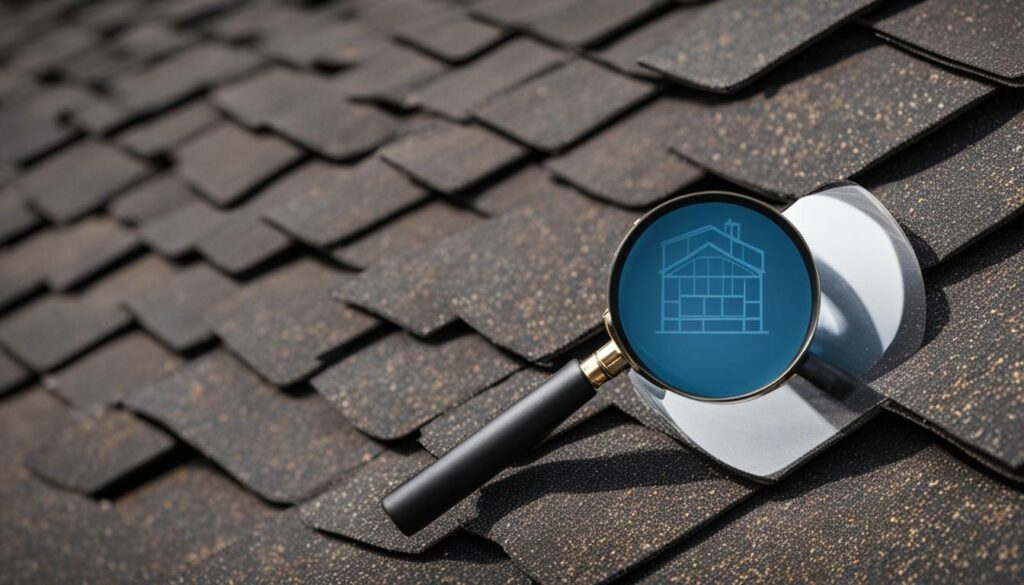
Contractor warranties typically focus on workmanship and installation, but it’s important to review the specific coverage and any warranty exclusions. These warranties provide assurance that the contractor will rectify any issues that arise due to faulty installation or workmanship. However, it’s crucial to understand the limitations and exclusions within these warranties to avoid any surprises.
When reviewing a contractor warranty, pay attention to any exclusions that may void the warranty. Common exclusions include damage caused by natural disasters, improper maintenance, or alterations made by third parties. Understanding these exclusions will help you make informed decisions about maintaining your roof and protecting your warranty.
Additionally, contractor warranties may have specific conditions that need to be met for the warranty to remain valid. For example, some warranties require regular inspections or roof maintenance. Neglecting these conditions could result in the warranty being voided, leaving you responsible for any future repairs or replacements.
Benefits of Contractor Warranties
While contractor warranties typically focus on workmanship rather than material defects, they can still provide valuable protection for your roof. A well-crafted contractor warranty gives you peace of mind, knowing that the contractor stands behind their work and is committed to resolving any issues that may arise. This can save you from unexpected expenses and ensure the longevity of your roof.
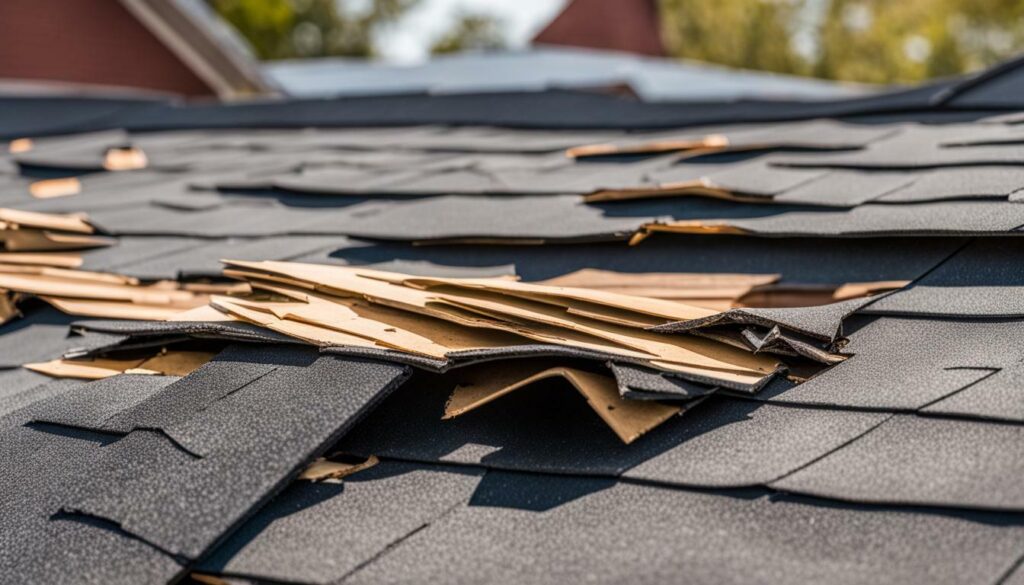
It’s important to carefully review and understand the terms and conditions of your contractor warranty. By doing so, you can make informed decisions regarding maintenance, repairs, and any necessary warranty claims. Remember, a strong contractor warranty is a testament to the contractor’s commitment to quality workmanship and customer satisfaction.
| Contractor Warranty Checklist |
|---|
| Review coverage and exclusions |
| Understand any warranty conditions |
| Keep up with regular inspections and maintenance |
| Document any issues or concerns |
| Contact the contractor promptly in case of a problem |
Protecting Your Roof Warranty
Taking proactive steps to protect your roof warranty can help ensure coverage in the event of any issues or claims. Regular inspections are crucial to identify and address any potential problems before they escalate. By conducting inspections at least twice a year, preferably in the spring and fall, you can catch small issues early on and prevent them from causing significant damage to your roof.
Another essential step in protecting your warranty is to stick with your original contractor. Your contractor is familiar with the installation and may have specific recommendations for maintenance and repairs that align with the warranty requirements. Additionally, sticking with the original contractor ensures that any potential warranty claims can be easily addressed, as they already have a record of the work done.
Registering your warranty with the manufacturer or contractor is another important step. This ensures that your warranty is on file and easily accessible if any issues arise. It also helps establish a clear timeline of when the warranty coverage started, making it easier to determine its applicability in case of a claim.
Lastly, don’t forget to read the fine print of your roof warranty. Understanding the scope of coverage, any exclusions, and how to navigate warranty claims is crucial. Pay attention to details such as no dollar limit warranties, which provide coverage without a predetermined maximum payout, and warranty exclusions that may limit coverage in certain circumstances. By being informed about your warranty terms, you can make better decisions to protect your investment and ensure the longevity of your roof.
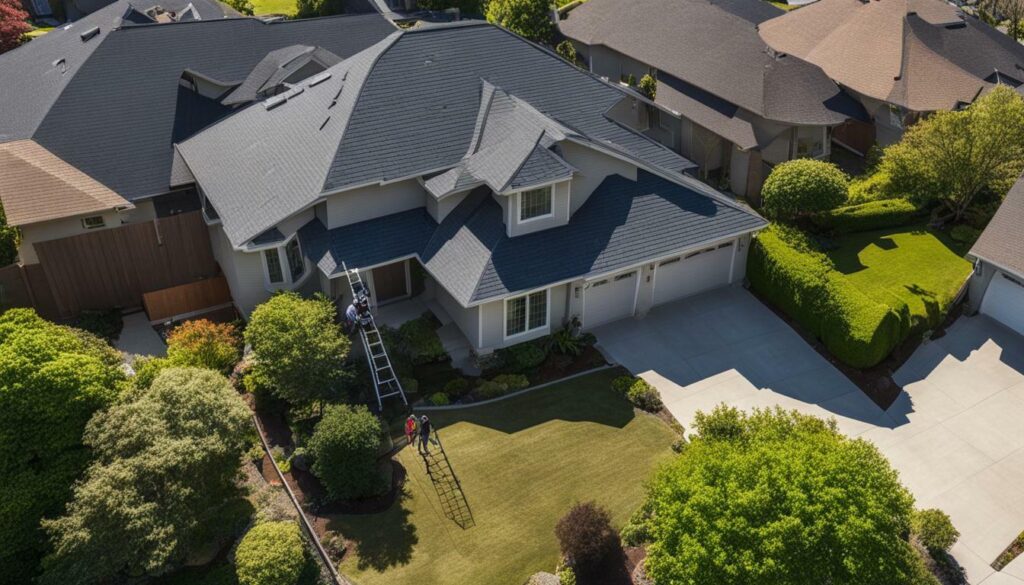
Regular roof inspections offer numerous benefits, including:
- Early detection of potential issues
- Prevention of costly repairs
- Extension of the roof’s lifespan
- Preservation of the warranty coverage
During inspections, professionals can identify signs of wear and tear, damaged shingles, leaks, or any other issues that may compromise the integrity of your roof. Addressing these problems promptly can prevent further damage and preserve your warranty coverage.
Sticking with Your Original Contractor
Choosing a reputable and experienced contractor for your roof installation is crucial. By sticking with your original contractor, you can:
- Ensure consistent quality of workmanship
- Benefit from any additional warranty offered by the contractor
- Have a point of contact for warranty claims and repairs
Your original contractor is familiar with the specifics of your roof installation and can provide valuable insights on how to maintain it properly. They can also facilitate any warranty claims and repairs, ensuring a smooth process.
Registering Your Warranty
Registering your roof warranty with the manufacturer or contractor is a simple but crucial step. It provides you with a documented record of the warranty and establishes the start date of the coverage. In case of a claim, having your warranty registered ensures that you can easily access the necessary information and support from the warranty provider.
Understanding Key Warranty Terms
Familiarizing yourself with key warranty terms is crucial to fully understand the scope and limitations of your roof warranty. By knowing these terms, you can make informed decisions and effectively communicate with your roofing contractor or manufacturer.
Lifetime Warranty
A lifetime warranty is a term often used in the roofing industry, but it’s important to understand what it truly means. Contrary to popular belief, a lifetime warranty does not cover the entire lifespan of your roof. Instead, it typically refers to the duration of your ownership.
For example, if you sell your house and transfer ownership, the lifetime warranty may not carry over to the new owner. Therefore, it’s essential to clarify the specifics of a lifetime warranty with your contractor or manufacturer.
Limited Warranty
A limited warranty sets specific parameters for coverage. It may cover defects or issues related to the roofing materials or workmanship, but there are often limitations. These limitations can include exclusions for certain conditions or events that may void the warranty.
Reading the fine print of a limited warranty is crucial to understanding what is covered and what is not. It’s important to ask questions and seek clarification from your contractor or manufacturer if there are any terms or stipulations that are unclear.
Void Warranty
A void warranty is a warranty that is no longer valid due to certain actions or circumstances. Voiding a warranty can occur if there is evidence of improper installation, neglect, or failure to adhere to the maintenance requirements specified by the manufacturer or contractor.
Understanding what can void your warranty is essential to ensure you don’t inadvertently invalidate your coverage. It’s crucial to follow the recommended maintenance guidelines and address any repairs or issues promptly to maintain the validity of your warranty.
Warranty Exclusions
Warranty exclusions refer to specific items or events that are not covered by the warranty. These exclusions can vary depending on the type of warranty and the manufacturer or contractor. Common exclusions may include natural disasters, acts of God, or damage caused by improper maintenance or modifications.
Reviewing the warranty exclusions is important to know what is not covered and to take any necessary precautions to prevent such exclusions from affecting your warranty. In case of any doubts or uncertainties, consult with your roofing professional for clarification.
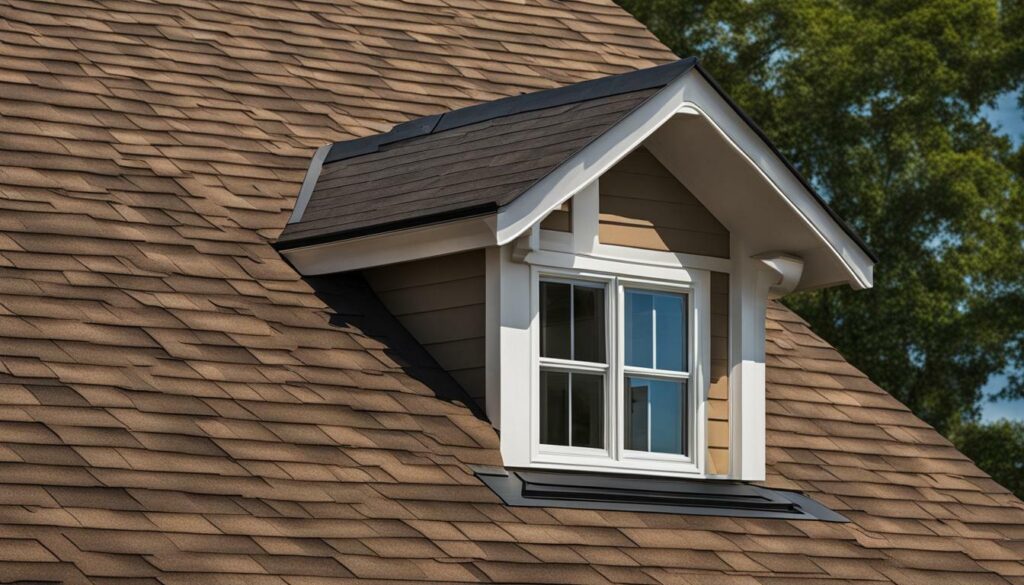
Understanding the length and coverage of your roof warranty is essential to make informed decisions and ensure maximum protection for your investment. A roof warranty provides you with peace of mind, knowing that your roof is protected against defects in materials and workmanship. However, the terms and conditions of each warranty may vary, so it’s crucial to familiarize yourself with the specifics.
When assessing the length of your warranty, it’s important to understand the determination of applicability. Some warranties may only apply to specific roofing systems or installations, while others may have specific requirements or limitations. By knowing the scope of coverage, you can effectively evaluate whether the warranty aligns with your needs and expectations.
Another aspect to consider is whether the warranty is transferrable. A transferrable warranty can be a significant advantage if you decide to sell your property, as it adds value and reassures potential buyers. However, not all warranties can be transferred, so it’s crucial to confirm this detail before making any decisions.
To help illustrate the importance of understanding the length and coverage of your warranty, let’s take a closer look at the following table:
Table: Roof Warranty Comparison
| Warranty Type | Length | Coverage | Transferrable |
|---|---|---|---|
| Manufacturer Warranty | 20 years | Material defects | No |
| Contractor Warranty | 10 years | Workmanship issues | Yes |
| Extended Warranty | Additional 10 years | Material and workmanship | Yes |
As demonstrated in the table above, the length and coverage of your warranty can vary significantly depending on the type of warranty and the specific terms outlined by the manufacturer or contractor. By reviewing this information, you can assess the level of protection offered by each warranty and make an informed decision that aligns with your needs and expectations.
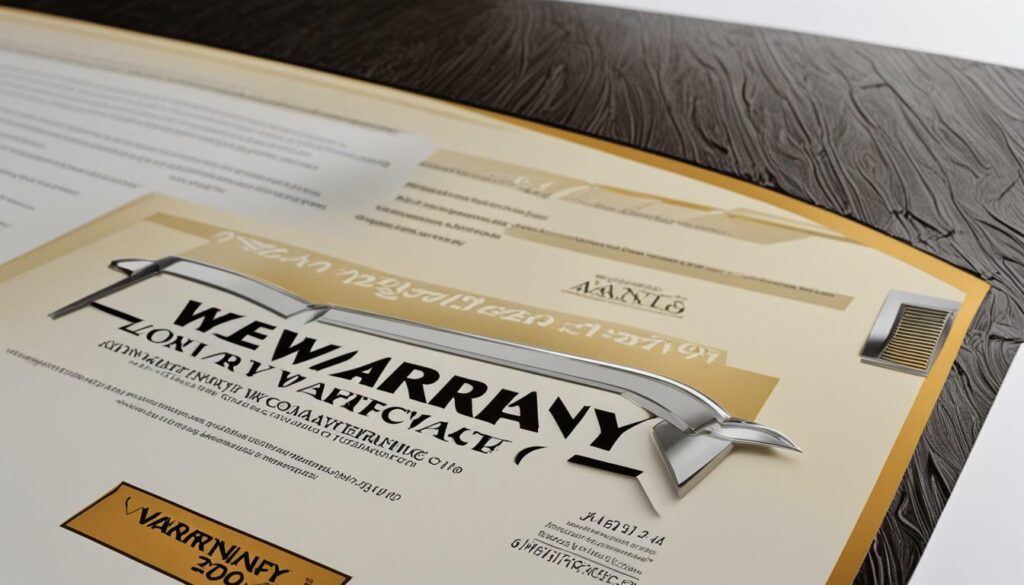
In summary, understanding the length and coverage of your roof warranty is vital to protect your investment. Take the time to review the determination of applicability, transferrable options, and specific terms to ensure you have the right level of protection for your roof. By being proactive and knowledgeable about your warranty, you can prevent any unexpected expenses and enjoy the peace of mind that comes with a well-protected roof.
Standard Roof Warranties
Standard roof warranties typically consist of material warranties covering defects in roofing materials and workmanship warranties ensuring proper installation and performance. Material warranties are provided by the manufacturer and cover any issues with the materials used in your roof. These warranties typically last for a specified period, such as 25 years, and offer protection against manufacturing defects. It’s important to carefully read the terms and conditions of the material warranty to understand what is covered and for how long.
Workmanship warranties, on the other hand, are provided by the contractor and cover the installation of your roof. They ensure that the workmanship meets industry standards and that your roof performs as expected. Workmanship warranties can vary in length and coverage, so it’s crucial to clarify these details with your contractor before installation.
One of the key factors in a roof warranty is system performance. This refers to how well the roofing system functions in terms of waterproofing, insulation, and overall durability. A good warranty should address any performance issues that may arise and provide remedies for them. It’s important to understand how system performance is defined within your warranty to ensure you are adequately protected.
| Warranty Type | Covered By | Coverage | Duration |
|---|---|---|---|
| Material Warranty | Manufacturer | Covers defects in roofing materials | Varies (e.g., 25 years) |
| Workmanship Warranty | Contractor | Covers installation and performance | Varies (e.g., 5 years) |
When evaluating different roof warranties, it’s important to ask questions about the length and coverage of each warranty. Determine whether the warranty is transferrable if you plan to sell your property, and inquire about any warranty exclusions that may limit the coverage. Understanding the terms and conditions of your warranty will help you make an informed decision and ensure you are adequately protected.
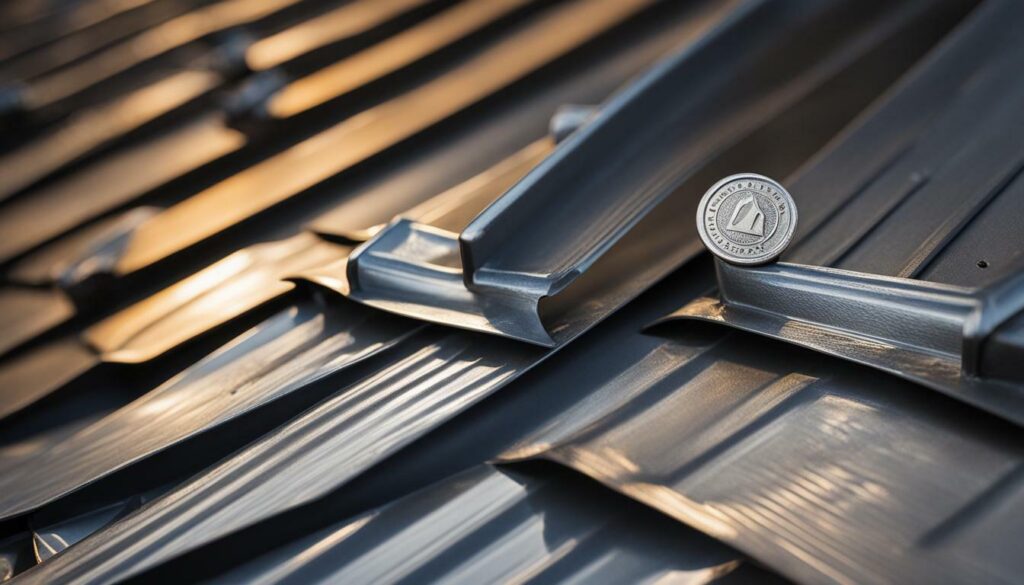
Lifetime warranties for roofs provide coverage for the duration of your ownership, offering long-term protection for your investment. These warranties are designed to give you peace of mind knowing that your roof is protected against defects and issues that may arise over time.
When considering a lifetime warranty, it’s important to understand what it covers and the terms and conditions that apply. Some lifetime warranties may only cover certain aspects of the roof, such as the roofing materials, while others may include both materials and workmanship.
To fully comprehend the coverage provided by a lifetime warranty, it’s essential to read the fine print and ensure that you understand the specific terms and conditions. This includes any exclusions or limitations that may void the warranty.
| Key Points About Lifetime Warranties |
|---|
| 1. Lifetime warranties cover the duration of your ownership. |
| 2. The coverage may include roofing materials and workmanship. |
| 3. Read the fine print to understand any exclusions or limitations. |
| 4. Register your warranty to ensure you are eligible for coverage. |
In addition to understanding the coverage provided by the lifetime warranty, it’s also important to register your warranty with the manufacturer or contractor. By registering your warranty, you ensure that you are eligible for coverage and can take advantage of any necessary repairs or replacements that may be required in the future.

“A lifetime warranty is an investment in the long-term protection of your roof. It provides peace of mind and ensures that you are covered for any unforeseen issues that may arise over the course of your ownership.”
By understanding the ins and outs of lifetime warranties, you can make an informed decision when choosing the right warranty for your roof. Remember to ask questions, read the fine print, and register your warranty to ensure that you are fully protected.
Reading the Fine Print
Carefully reviewing the fine print of your roof warranty is essential to understand any financial limitations and the extent of coverage provided. This close examination allows you to ensure that your investment is protected and that you know what to expect in the event of any issues with your roof.
One key term to look out for is “no dollar limit.” This means that there is no cap on the amount that will be paid out for repairs or replacements covered by the warranty. It provides you with peace of mind knowing that you won’t be stuck with unexpected costs if you encounter significant damage to your roof.
When reviewing the fine print, pay attention to the scope of coverage. Different warranties may have different levels of protection, so it’s crucial to know exactly what is included. Look for explicit details about the covered components, such as roofing materials, workmanship, and system performance. Understanding the scope of coverage ensures that you won’t be caught off guard by uncovered issues that may arise.
| Key Terms | Definition |
|---|---|
| No dollar limit | Indicates there is no cap on the amount paid out for repairs or replacements covered by the warranty. |
| Scope of coverage | Description of the specific components and areas covered by the warranty. |
It’s also important to be aware of any warranty exclusions that may limit or void your coverage. These exclusions could include inadequate maintenance, improper installation by someone other than the original contractor, or damage caused by natural disasters. By understanding these exclusions, you can take the necessary steps to fulfill the warranty requirements and avoid potential issues.
Take the time to read the entire warranty document thoroughly, including any supplemental documents or attachments. If you have any questions or concerns about the terms and conditions, don’t hesitate to reach out to the manufacturer or contractor for clarification. Remember, the warranty is there to protect your investment, so make sure you have a clear understanding of what it entails.

Conclusion
Understanding the details of your roof warranty is crucial to safeguard your investment and ensure peace of mind for years to come. When investing in a new roof, it’s important to be aware of the two main types of warranties: manufacturer warranties and contractor warranties.
Manufacturer warranties typically cover defects in roofing materials for a specific period. However, they may not cover workmanship and could be prorated, meaning the coverage decreases over time. On the other hand, contractor warranties vary and may only cover workmanship, addressing any installation issues that may arise.
To protect your warranty, there are several steps you can take. First, make sure to schedule regular inspections to identify any potential issues early on. Additionally, sticking with your original contractor ensures that your warranty remains valid. It’s also important to register your warranty with the manufacturer or contractor to ensure you have proper documentation.
Lastly, reading the fine print of your warranty is essential. Standard roof warranties typically include material warranties from the manufacturer and workmanship warranties from the contractor. Key terms to pay attention to include determination of applicability, transferrable warranties, and warranty exclusions. Understanding these terms will help you fully comprehend the scope of coverage and any limitations or exclusions that may apply.
By understanding your roof warranty and taking the necessary steps to protect it, you can ensure that your investment is well-protected and enjoy peace of mind for years to come.
FAQ
Q: What are the two main types of roof warranties?
A: The two main types of roof warranties are manufacturer warranties and contractor warranties.
Q: What does a manufacturer warranty typically cover?
A: A manufacturer warranty typically covers roofing materials, but not workmanship.
Q: Are manufacturer warranties prorated?
A: Yes, manufacturer warranties may be prorated, meaning the coverage decreases over time.
Q: What do contractor warranties usually cover?
A: Contractor warranties usually cover workmanship, but the coverage may vary.
Q: How can I protect my roof warranty?
A: To protect your roof warranty, get regular inspections, stick with your original contractor, register your warranty, and read the fine print.
Q: What is a material warranty?
A: A material warranty covers defects in roofing materials for a specific period of time.
Q: What is a workmanship warranty?
A: A workmanship warranty covers installation issues and related problems with the roofing work.
Q: Do lifetime warranties cover the entire lifespan of the roof?
A: No, lifetime warranties cover the duration of your ownership, not the lifespan of the roof.
Q: What are some important key warranty terms to understand?
A: Key warranty terms include contractor warranty, determination of applicability, extended warranty, lifetime warranty, limited warranty, manufacturer warranty, prorated, no dollar limit, scope of coverage, system performance, transferrable, void warranty, and warranty exclusions.






